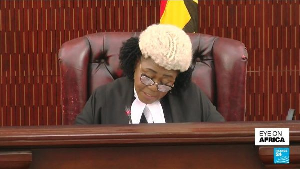Accra, July 27, GNA - The Ghana Trade and Livelihoods Coalition (GTLC), an advocacy group, on Monday warned that the Northern Star Tomato Factory (NSTF) risks imminent collapse, unless tomato production is stepped up to meet processing requirements.
Mr Ibrahim Akalbila, Co-ordinator of the GTLC, said only an all year-round production of tomato to feed the company's operational demands would avoid the demise.
The GTLC, which is currently undertaken feasibility studies to come out with an implementation model for a proposed tomato joint venture between Ghana and Burkina Faso, said inability of farmers to step up production had resulted in the factory halting production for most part of the year.
The joint venture is to facilitate increased production of tomatoes in the two neighbouring countries to meet the demands of households and the factory, which is based at Pwalugu in the Upper East Region. Currently, Ghana produces about 6,960 tonnes for every season and gets an additional supply of 6,562 tonnes from Burkina Faso, which is purchased mostly by traders.
"Put together the annual production in the two countries fell far short of the requirement of the Northern Star Tomato Factory, which could process 500 metric tonnes per day,' Mr Akalbila told the Ghana News Agency in Accra.
"Given that the quantities from the two supply areas are available to the factory, it will take only 27 days to process and leave the factory idling for another season," he said.
Mr Akalbila said to fully engage the factory for 12 months, annual production must increase to 180,000 metric tonnes. "Thus, not only do we need to double production to two farming seasons but also work effortlessly at increasing yield per acre...or increasing cultivable land for the catchments area. This could also be achieved by roping in tomato growing communities that are currently not fully engaged in the production."
He said there was the possibility for increased production, citing towns such as Pwalugu, Doba, Chuchuliga, which have available cultivable land of 2,900 acres for dry season farming. Mr Akalbila said to give meaning to the proposal farmers of the two countries held a sub-regional durbar in Navrongo to discuss the problems facing tomato production..
He said the meeting, a collaborative effort between GTLC and the Burkina Faso-based Organisation Reinforcement de Capacites Development, seeks a new partnership in finding common solutions to issues affecting farmers in the two countries.
Research work by the two organisations indicates that farmers in both countries are faced with the problem of price-cutting, especially during the harvest season due mainly to unavailable market opportunities.
"There is no doubt that to reach that point, we need a sure and free market and get the inputs easily. We must increase the production of tomato to improve the economic situation of our two countries," affirmed Akalbila.
"But to carry out this dream, we need a synergy of action with the support of the governments of the two countries."
Mr Akalbila said discussions on support for the joint venture with Ecobank Ghana and United Bank for Africa had been positive with the two banking institutions expressing high level of interest in partnering government and the NSTF to handle the financial obligations of the proposed venture.
The banks are also willing to offer credit to farmers under an out-grower scheme to produce and supply the factory.
Business News of Monday, 27 July 2009
Source: GNA
















